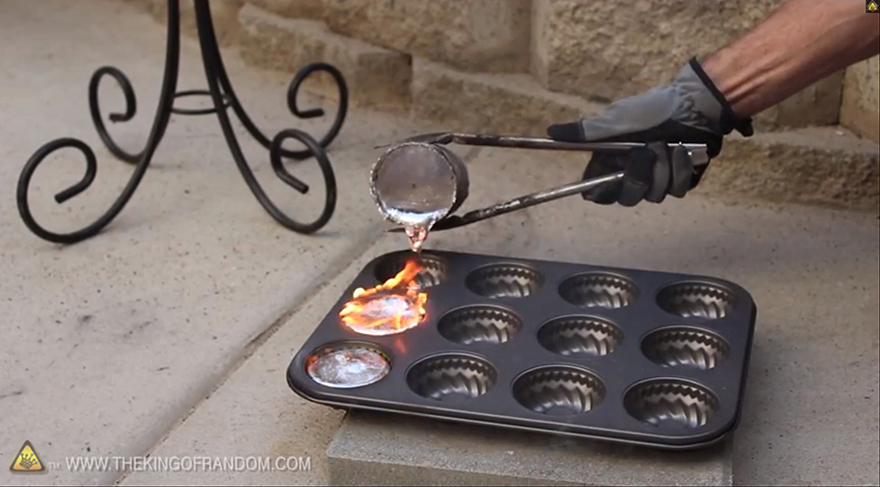
Grant Thompson Shows You How to Melt Soda Cans Down for the Aluminum


When we throw things into the recycling bin, we know they'll be trucked off and re-processed at some magical, unseen facility. But a handful of people are getting a bit more involved in the process by re-purposing the material themselves. Last year we saw this guy turning plastic bottles into string, and now Grant Thompson, a/k/a "The King of Random," shows you how to turn spent cans into aluminum ingots.


"For as long as I can remember, I've been intrigued by the idea of melting metal and making things with it," Thompson writes. "The problem has always been that it was out of reach or required really expensive equipment."
To solve this, Thompson began creating multiple versions of a DIY foundry using commonly available materials. By his tenth prototype--made from a galvanized steel pail, Plaster of Paris and sand--he had a winner. Watch as he walks you through the process of self-producing ingots:
Crazy, no? And yes, Thompson's fully aware of the inefficiencies in the process:
Aluminum cans are one of the worst sources for aluminum to cast with, and some soda cans in the UK are actually made of steel. The alloy was meant for extrusion, so is not the best for casting. They also produce more dross (slag) because the thin walls oxidize quickly and the plastic coatings on the cans add impurities. A better source of aluminum for casting would be cast aluminum items from thrift stores, like electric skillets or small engine blocks from lawnmower shops.
For those of you thinking of trying this, it will of course require certain safety precautions. Hit the jump to read Thompson's list of the potential hazards and how to avoid them.- The crucible I used was steel, but it's important to note that steel can be soluble in molten aluminum. It's possible that when you lift the crucible out of the foundry, the bottom can dissolve out and drop molten aluminum onto you feet and onto the ground. A good refractory crucible can be purchased for about $30 online.
- Lastly, casting over concrete poses risks of steam explosions. If molten aluminum falls to the ground, it can superheat the moisture in the concrete and cause it to spall (steam explosion) where the aluminum lands. This can potentially send hot concrete and molten aluminum spraying everywhere. When possible, melt and pour metal over sand to minimize risks.
Note: Wearing polyester gloves like the ones I had in the video is risky because the material can melt into your hands if you get splashed by hot aluminum. This can potentially leave burns where the metal lands, ringed by plastic burned into the skin.
-
o1Favorite This
-
Q1Comment
K
{Welcome
Create a Core77 Account
Already have an account? Sign In
By creating a Core77 account you confirm that you accept the Terms of Use
K
Reset Password
Please enter your email and we will send an email to reset your password.

Comments
I think it is important for everyone to know that it is Professional Grade Plaster of Paris that Grant uses. There are different grades,so this is important I think.